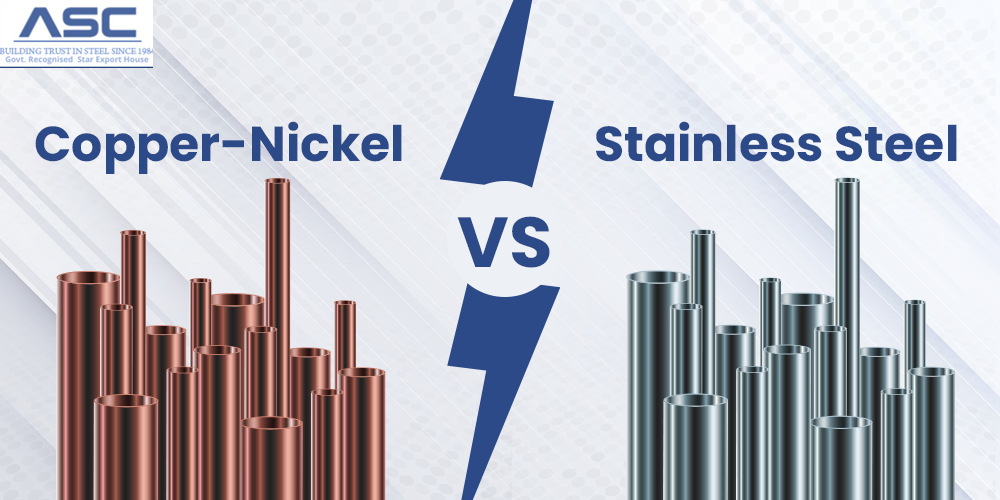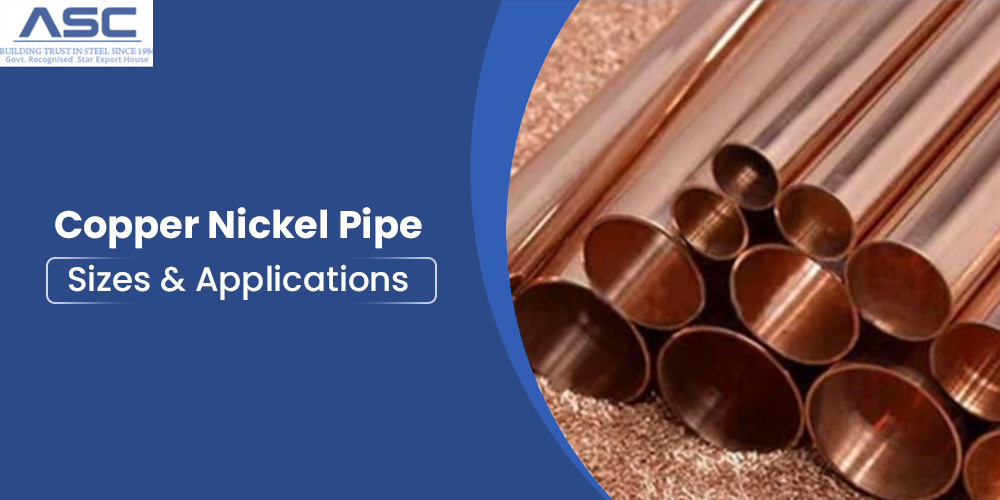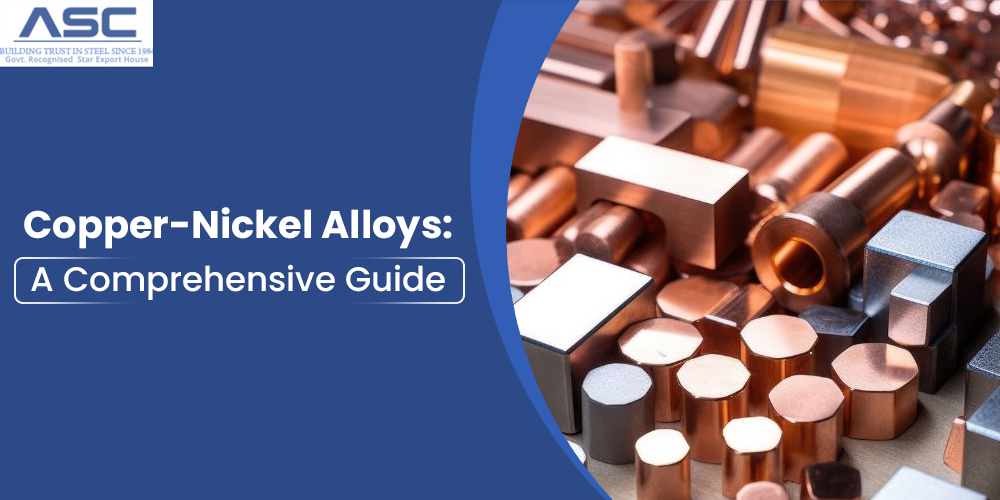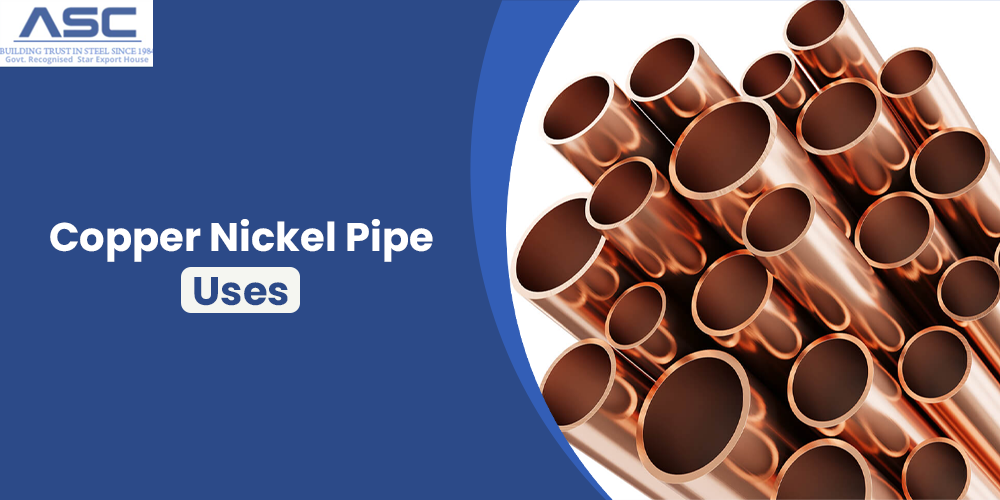Copper-Nickel vs. Stainless Steel
by AMC
Posted on September 18, 2024 at 12:40 PM

When selecting a material for your next project, several factors need to be weighed, including cost, durability, and corrosion resistance. Whether you're an engineer, or homeowner, choosing the right metal is crucial for ensuring the success and longevity of your project.
In this blog, we’ll explore the key differences between copper-nickel and stainless steel, two of the most commonly used metals in construction. Comparing copper-nickel and stainless steel can help you decide which one is best for your next project.
When comparing copper-nickel and stainless steel based on their properties, both materials offer distinct advantages. Let's take a closer look at each to help you decide which is best for your project.
What is Copper Nickel?
Copper-nickel is an alloy primarily composed of copper and nickel, with nickel content usually ranging from 10% to 30%. This blend gives copper-nickel a range of desirable properties, making it particularly effective in harsh environments. One of its standout features is its exceptional resistance to corrosion, especially in seawater, which makes it ideal for marine applications. Copper-nickel alloys offer several advantages that make them a strong alternative to stainless steel for various applications. One of the key benefits of copper-nickel is its exceptional resistance to corrosion, particularly in harsh environments such as saltwater and high-humidity areas. This makes it an ideal choice for marine applications, where exposure to seawater can cause rapid deterioration of other metals.
In addition to its corrosion resistance, copper-nickel is highly durable and can withstand extreme conditions without degrading. It is also very malleable, meaning it can be easily shaped into complex forms, which is useful for custom fittings and components.
Despite these advantages, copper-nickel does come with some drawbacks. It is generally more expensive than stainless steel, which can impact the overall cost of a project. Additionally, to maintain its attractive finish and performance over time, copper-nickel may require more regular maintenance and care. This includes periodic cleaning and inspection to prevent tarnishing and ensure longevity.
Check out our wide selection of Copper Nickel products, including pipes, tubes, flanges, and fittings, all known for their great corrosion resistance.
What is Stainless Steel?
Stainless steel is a popular choice because it’s strong and doesn’t rust easily. It can handle high temperatures, so it's good for projects that deal with heat or harsh conditions. Even though it resists rust, it still needs regular cleaning to stay shiny. Stainless steel tends to cost more than copper-nickel, so budget might be a factor when picking the right metal for your project.
Stainless steel comes in different types, each suited for specific uses. It’s commonly used in kitchen tools, building materials, and car parts because it’s durable and looks good. However, if you’re looking to save money or want a metal that needs less maintenance, copper-nickel might be a better choice.
Copper-Nickel vs. Stainless Steel - Properties and Composition
Copper-nickel alloys, also known as cupronickel, are made from copper and nickel, along with a few other elements like iron and manganese. These alloys are known for their great resistance to corrosion, good heat conductivity, and low thermal expansion. Stainless steel is made from steel mixed with chromium, nickel, and other elements to make it strong, resistant to rust, and flexible.
Corrosion Resistance of Copper-Nickel & Stainless Steel
Copper-nickel alloys excel at resisting rust and corrosion, especially in marine environments. They are highly effective against seawater corrosion, making them ideal for use in coastal and offshore applications. In contrast, stainless steel performs better in environments with strong chemicals and acids.
Copper-Nickel vs. Stainless Steel: Mechanical Differences
Copper-nickel alloys are known for their excellent malleability and ductility, which makes them ideal for applications that need materials to be bent or shaped easily. While stainless steel is very strong and resistant to wear and tear, copper-nickel’s flexibility makes it a better choice for projects requiring complex forming and bending.
Applications of Copper-Nickel and Stainless Steel
Copper-nickel alloys are widely used in marine and offshore applications, heat exchangers, and electrical equipment due to their excellent corrosion resistance and durability. They are well-suited for environments where exposure to seawater or other harsh conditions is common.
Choosing the right material for your project is crucial for its success. While copper-nickel alloys and stainless steel both offer exceptional properties, your decision should be based on factors like cost, corrosion resistance, mechanical properties, and the specific requirements of your application.
For high-quality copper-nickel bars or other materials for your project, Amardeep Steel can provide what you need. Contact us today to learn more about our products and services.
Conclusion
When choosing the right metal for your project, copper-nickel alloys offer exceptional benefits. Known for its outstanding corrosion resistance, especially in marine environments, Copper Nickel is ideal for applications exposed to seawater and harsh conditions. Although it may come with a higher cost and require regular maintenance, its durability and flexibility often justify the investment.
In contrast, while stainless steel is strong and resistant to rust, it doesn’t match the corrosion resistance of Copper Nickel in marine settings. For projects where superior corrosion resistance and durability are crucial, Copper Nickel is the clear choice.
For high-quality Copper Nickel materials, contact Amardeep Steel today. We offer a range of Copper Nickel products tailored to meet your project needs.
FAQ
Is copper-nickel better than stainless steel?
Copper-nickel is better for marine environments and applications requiring flexibility, thanks to its excellent seawater corrosion resistance. Stainless steel, however, is stronger and more resistant to chemicals and acids, making it ideal for industrial uses. The choice depends on your project's specific needs.
Which is costly: copper nickel or stainless steel?
Copper is generally more expensive than stainless steel. This is because copper is rarer and harder to obtain. However, the cost difference isn't always huge, so it's a good idea to compare prices and consider your budget before making a final decision.
What is copper-nickel used for?
Copper-nickel alloys are used in seawater desalination systems, heat exchangers, and various water and oil systems. They are ideal for condensers, coolers, fire mains, and hydraulic lines due to their corrosion resistance and durability.


